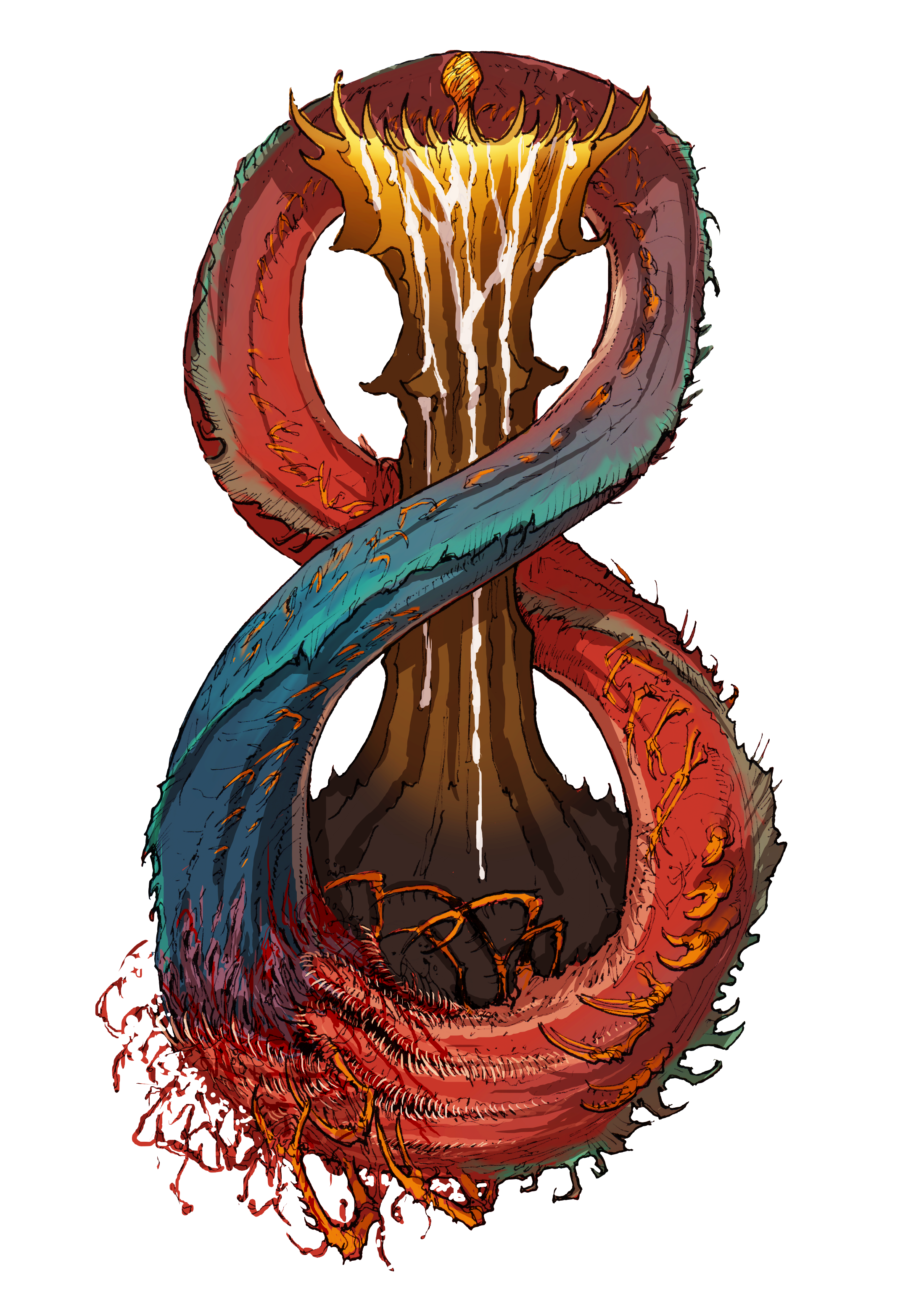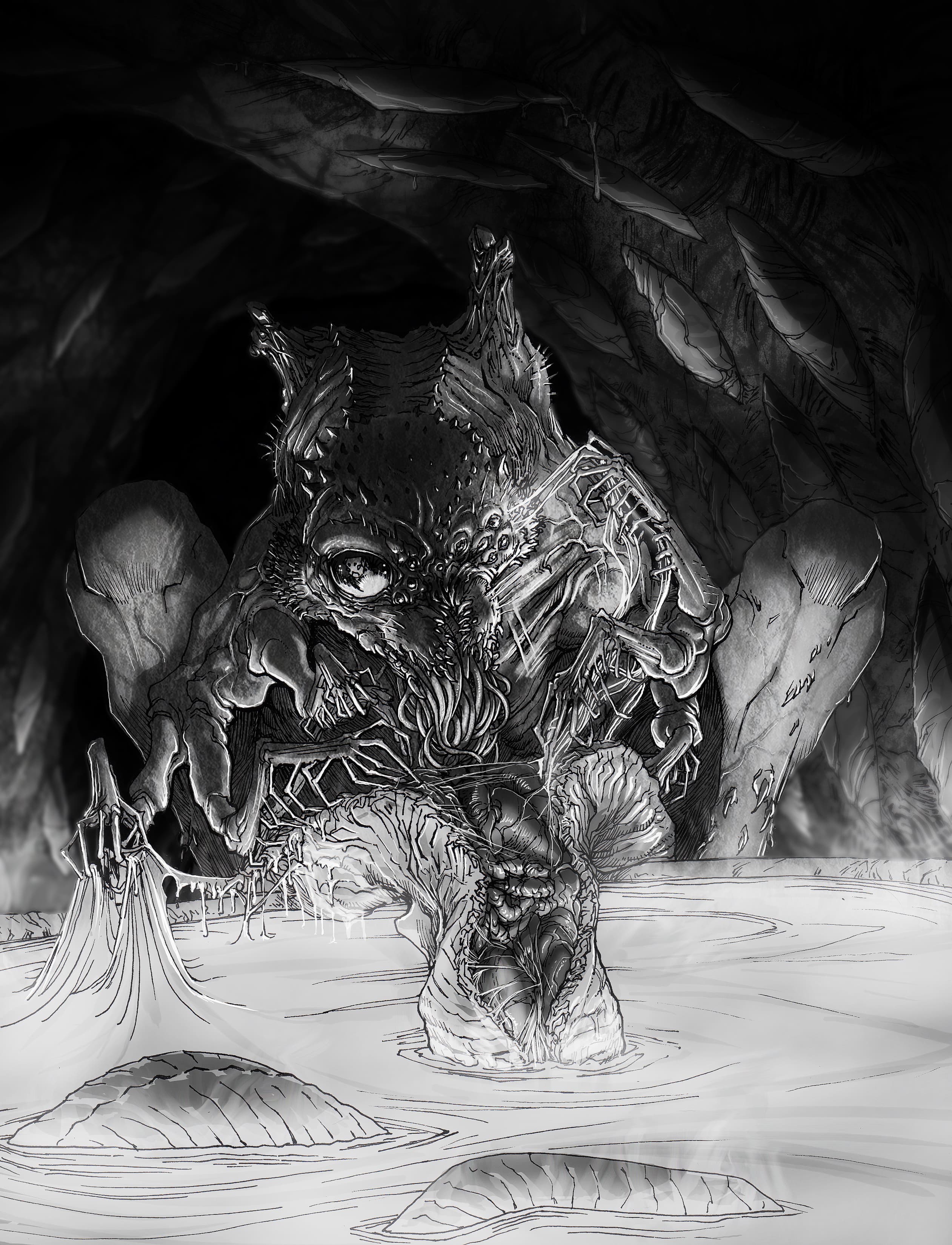

I looked into the abyss, and you looked back. My old friend, what is it you always say? An eye for an eye? I traded you mine, and you gave me yours. Now I see women I cannot be, men I cannot have, and children I cannot bear. What hell is this that you have trapped me in? Now I am the abyss, and you no longer look back.
Icarus pressed his ear to the ground, listening close for a sound, the gentle drip of thick syrup against the dust. It hadn’t rained in a week since killing the last engineer.
He struck the walls of his hive, the soft flesh collapsing beneath his fist, black ichor seeping under his nails.
How was he supposed to complete his masterpiece without paint?
Droughts were not uncommon, but to happen so soon after birth was unfortunate. The turning of the weather forced him to stay in one spot, and it made his spine itch.
Too open, too obvious, too close to the ground; Icarus was a nomad, after all.
Such idle behavior worked against him. Those who knew Icarus best expected him to hide in a drought. There was no need to be afraid of his dune ravagers or colossi. After all, the last of his brood had long since expired and he wouldn’t use his emergency stock of clay unless he was certain of the coming rains.
The ephemeral nameless collapsed not long after being shaped; such was the nature of their broods. Design when necessary, shape when ready. That was an engineer’s creed.
Only the inexperienced shared life without a plan, their creations dying in the dust without ever touching their enemy’s throat.
Sometimes, prudence paid off.
Icarus stood over a pulsing vat of red fluid, dipping his fingers into the solution, which felt like sludge, thick, greasy, and easily rolled in his palm.
With a hiss, he tore open his wrist, peeling back the scales and undoing the stitching.
Drip, drip.
His blood was scarlet red, deeper than the fluid that filled the vats; One, two, three drops, just enough to keep the clay from coagulating. He mixed his blood in with the passing of every full moon.
He glimpsed the moon once or twice while carrying corpses of his most valuable creations into the caves. It hung in the air like a pale blue light that slowly descended from the sky, waxing and waning like a pendulum. The light was never sufficient, serving only to dilate milky white eyes.
The engineers called it the tonsil; that is where the Pallid Throne bloomed. That pale blue structure was strung to the roof of the Overworld by mounds of pink flesh that stretched like rubber, thick and moist.
The tonsil responded to their struggles, descending further with each life taken. Under their mother’s rule, the throne was within reach only when the strongest remained.
Icarus’s stomach growled as he licked his lips. He could taste it in the soil, that golden nectar, that sweet maple, that thick lacquer. Like the red rain, drops of the Pallid Throne’s bounty fell from the skies above, coating the surface world.
Drip, drip, the thick syrup tapped on the mausoleum, waking the names from their slumber.
The nameless were the first to taste the Pallid nectar. After that, the change was aggressive. Docile larvae became vicious, lashing out for another taste, killing their neighbors, and growing stronger.
They are the Domestidae vibriatius, the ones shaped without shapers, the most appropriate vessels for the engineers. Indeed, the greatest among them was sculpted by chaos and entropy, and the oldest names have first pick.
Icarus dipped his finger into the red ichor once more, swirling the solution, which stuck to his scales like a spider’s web.
The crimson rain differed from the golden nectar. The red ichor didn’t come from the tonsil, but from the Overworld’s roof, the parietal lining of the stomach. Leviathans sweat on the inside, and they sweat blood.
Domestidae eldriatus, that’s the second generation. The imperfect ones shaped by the engineers, ephemeral, cruel, and relentless.
Icarus kept the corpses close, the colossi with melted teeth and parted gums, and the sidewinders with sundered chitin and spilled insides. The blood had long clotted, and it would be impossible to shape the corpses as they were.
Impossible, at least until the rains returned.
Even the weakest of engineers had weather sense—a lateral movement of tiny hairs beneath the collarbone; the stiffening of one’s arterial wall.
Even in a drought, none were blind save Icarus himself.
Perhaps it was because he was the oldest or the first to fall from grace. Either way, Icarus couldn’t sense the coming rains and beat the ground in frustration. Even those lesser had the upper hand, planning in the dark while he fumbled about, never knowing when to strike.
But this time was going to be different.
Perhaps there was a way around his weakness, his blindness, but first, he needed to return to the dark world and set a trap. His body would be the bait. A strong vibriatus was too intoxicating for a young engineer to ignore.

Icarus wrenched himself free of his flesh-bound vessel, ropes of pink tissue wrapping around his essence, turning pale and squeezing tight. The organs stretched, and pieces of collagen ripped open while he struggled to undo the buckles.
Schlock!
The tissue gave way, and his spirit spilled forth as an intense but porous light which slapped the ground like writhing tentacles and slithered across the cave walls. He existed as neither wave nor particle and slipped through the Overworld as quickly as water through a sieve, returning to the sunken plain.
This place was black, so black that even his light sputtered like a lit candle in a sealed jar. The oxygen was gone, his light depleting, and he gasped, reaching out.
“Mother, I’m home.”
Icarus felt it now, an appetite once repressed by the Pallid Throne’s nectar and the cries of battle, but no longer.
He was hungry, so very hungry.
“Just a taste, mother. Just one taste.”
She was all around him, the walls of the sunken plane pressing close, embracing him as her own.
In this place without air, he could smell, striking and metallic like diesel fuel. In this place without light, he could see, golden brown with a marble red center. In this place without flesh, he could taste, sweet, savory, and sour, just like mother used to make.
One sip, that’s all he wanted: just one sip.
“No!”
Icarus pushed himself away as he heard a distant call. The sounds of splitting teeth, broken shells, and splattering blood. The sounds of battle. His brothers and sisters were dying out there.
He could taste their names, broken, bitter, and exhausted, ready for mother’s embrace after defeat. But Icarus wasn’t defeated, not yet.
What was it he was fighting for?
Drip, drip.
What was it he came here for?
Drip, drip, drip.
What was it he died for?
Drip, drip, drip, drip.
There was that taste again, as sweet as maple and lacquer thick. Oh, what he wouldn’t give for another bite. Yet, this flavor didn’t come from his mother’s womb. No, it came from somewhere else.
He could see a flowering structure in the distance. White petals spread from north to south, east to west. From its center was a soft blue light rocking back and forth as a golden substance leaked from the stalk and ran in rivers below the ground.
The Pallid Throne was open.
Icarus remembered now, the memories pelting him like hail as he kicked against the walls of the sunken plain. He wasn’t ready, not yet.
Mother’s arms were soft, warm, and tasted like nutmeg, but in her embrace, he withered away. He craved something that this place couldn’t provide; a hole that needed filling, an itch that needed scratching. An ambition so strong as to push even the meek from their nest.
There in the waking world was a flower that bloomed just for him—that golden nectar sickly sweet dripping down upon his mother’s feet.
He had to have it! Had to have it! Had to have it! Had to have it!
One last kick and he broke free from the walls, the porous light filtering back down from the dark world.
Where was his body? That’s right. He left it rampaging in that underground labyrinth and could feel it scratching at the walls and pounding its head against the ground. An enticing opportunity for an engineer without a vessel.
He had to get back quickly, while his senses remained, just a moment longer.
There, he felt another name, a weaker name, one left behind when all the vibriatus were taken. It was trying to fit into his skin, but the flesh wouldn’t give, wouldn’t grab hold, and anchor him in place.
The skull had already adapted to Icarus’s touch; the trap was sprung.
The rat king’s porous light dropped on top of the intruder, wrapping it close as the scarlet tendrils latched to his essence once more. That powerful vessel, Icarus’s vibriatus, drew from his spirit, and the body that once trembled and howled grew calm.
Everything was clear once more. Then he touched the tips of his fingers, bloody from clawing at the cave walls. Icarus filled his lungs with air and exhaled slowly.
It felt good to have a body again, but that was too close, even for him.
He felt the other name still struggling within him. There was no escaping this net, but his guest needed a place to stay.
Ah, how about one of his eyes? He had many, after all.
Shifting the radiant net, Icarus bound that lesser spirit to one of his left eyes, the engineer squealing like a rabid dog.
“What have you done to me?!” it shouted.
“I have given you a place in this war, a function for you to uphold,” Icarus said. “You will be my weather sense, and you will tell me when the rains come. Do this, and I will let you taste the nectar of the Pallid Throne when the crown is placed on my head. Do this, and I will make sure you’re the last to die.”